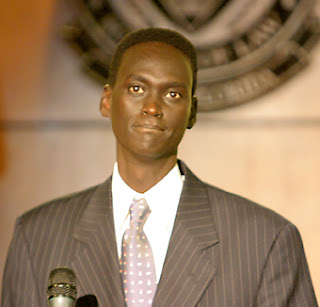TONIGHT ON THE TERRORDOME: Francis Bok, Abolitionist: - Escape from Enslavement in Sudan

CJSR FM88
http://www.cjsr.com/
6 PM Mountain Time
Few violations of human rights and human dignity are more profound than that of life-long forced labour.
People forced to work for others without pay and without liberty or rights are denied all the opportunities for joy, peace, personal relationships, education and social action that middle class and affluent people throughout the world take for granted.
Over the course of centuries, the European Holocaust against the civilisations of
This European holocaust against Afrika, called the Maafa by some Pan-Afrikanists, therefore claimed the lives of, at minimum, 48 million people, and ranks as one of the greatest crimes in human history, and also one of the most lucrative, since its profits financed the creation of the European and Euro-American empire.
But slavery as an institution is still widespread, even in the 21st Century. According to Voice of America, “the United Nations' International Labor Organization says more than 12 million people are enslaved in the world. Other estimates are higher. For example, Free the Slaves says at least 27 million people are held in bondage. But given the illegal nature of forced labor and the difficulty of verifying cases in populous countries like China and India, analysts say the total number will never be known. Most slaves live in Asia, while many are in [Green] Africa, Latin America and the Caribbean. The vast majority of victims are women and children.” In
For Pan-Afrikanists, little can be more horrifying than the notion that the enslavement of human beings is still being practiced on the Afrikan continent. Although the major players are transnational corporations, in that cocoa profits go to them, the ugly reality is that the enslavers on the ground are other Afrikans. That fact alone isn’t strange; throughout history, most people who were enslaved, were enslaved by people of the same colour, whether in Asia, Afrika or
Yet given the historical horrors perpetrated against the Afrikan peoples, the idea that any Afrikan enslaves another is uniquely repugnant.
Currently, attention is focused on
Why the Sudanese people are called Afrikans instead of Sudanese speaks to Western ignorance (in reportage about conflicts in Northern Ireland, Bosnia or Russia, no combatant-side is called "White" or "European" or "tribal"). Calling one side Arabs, though, speaks in part to Western hostility against Arabs and Muslims and also to the self-description of culturally and linguistically Arabised Sudanese. Given a change of clothes, much of the so-called “Arab” population of
Regardless of our miscomprehensions, people in
At the age of 17, [Francis Bok] escaped, eventually making it as far as
Bok launched the website iAbolish.com [and] has been honored by the Boston Celtics as a ‘Hero Among Us’ for community service, and in December 2001 he carried the Winter Olympic Torch on its national relay tour. His autobiography, Escape From Slavery, received outstanding reviews from Publisher's Weekly, The Boston Globe and The San Francisco Chronicle.”
Bok is currently an Associate at the American Anti-Slavery Group in






Comments